Introduction
If you’re a student or early-stage researcher in Computer Science, here is a top opportunity: the 2026 Max Planck Internships in Germany, as announced by Max Planck Program. These internships offer outstanding candidates from around the world the chance to work in world-class research institutes, with full financial support. This guide provides all the details you need — eligibility, benefits, how to apply — with the real application link.
Overview: What This Internship Is
- The internships are hosted by several Max Planck Institutes in Germany, specifically those focusing on Computer Science: the Institutes for Informatics (Saarbrücken), Software Systems (Saarbrücken & Kaiserslautern), and Security and Privacy (Bochum).
- It is fully funded: travel (round-trip), housing, living costs, and a stipend are included.
- Duration is typically 12-14 weeks, though in some cases longer internships may be possible.
- The working language is English. German language skills are not required.
- Applications are open worldwide. Students at the Bachelor’s, Master’s, or Doctoral levels, and even industry applicants with strong Computer Science backgrounds, can apply.
Key Eligibility Requirements
To be considered, applicants should fulfill the following criteria:
- Academic Level:
- Bachelor’s, Master’s, or PhD students.
- For Bachelor’s, usually with at least about three years of equivalent study in CS or a related field by the start of the internship.
- Background & Interest:
- Strong foundational knowledge in Computer Science.
- An interest in research. The projects will be customized to match academic background, prior experience, and research interest.
- Students with interdisciplinary interests or backgrounds (for example combining CS with social science, economics, law, etc.) are also welcome.
- Other Applicants:
- Those in industry with relevant experience who want exposure to academic research.
- Students who need to do a Bachelor’s or Master’s thesis project may sometimes convert the internship to a thesis if their home institution allows.
- Academic Record:
- Very good grades; competitive selection. All applicants are expected to have excellent academic performance.
- Other Requirements:
- CV / résumé.
- Transcripts of academic records.
- Contact information for at least one reference / referee.
- Optional motivation letter.
What You Gain: Benefits of This Internship
This program is attractive not just because it’s fully funded, but for the career and academic boost it gives:
- Full Financial Support:
The stipend covers living costs; housing is provided or subsidized; travel round-trip from your home country is included.
- Research Experience:
You will work under a faculty mentor in a prestigious Max Planck Institute doing research in your area of interest. This provides mentorship, possible authorship in publications, and exposure to high-level research culture.
- Networking & Career Development:
You’ll interact with international, multidisciplinary teams; getting this experience helps with graduate school applications, future research or academic jobs.
- Flexible Timing & Project Assignment:
While many interns choose the summer period, internships are offered year-round; project details are adapted based on your background.
Timeline & Deadline
- The next major deadline is November 1, 2025. This is for internships starting in the summer (May-August) of 2026.
- For internships starting outside the summer months, you generally need to apply at least 5 months in advance of your intended start date.
How to Apply: Step-by-Step
- Visit the Application Portal: Go to the official Max Planck internship application site. You must submit your application through that portal.
- Prepare Your Documents:
- Curriculum Vitae or résumé
- Academic transcripts (Bachelor/Master/PhD as applicable)
- Reference contact(s) (e-mail, affiliation)
- Optional but recommended: Motivation Letter
- (Optionally) You can indicate which faculty or research group you prefer and when you wish to do the internship.
- Submit Your Application Online: Use the portal above, fill in your personal info, academic history, project preferences if possible.
- Selection Process:
- Your application is reviewed by relevant research groups.
- There may be follow-up steps (interviews) if needed.
- Once selected, you are notified via email. Then you coordinate exact dates and project specifics.
Apply here: https://apply.cis.mpg.de/register/internship
Frequently Asked Questions
Do I need to know German?
No. The internships are conducted in English, so knowledge of German is not required.
Is IELTS or TOEFL required?
No explicit requirement for IELTS/TOEFL is mentioned. Strong English proficiency is implied via academic record and communication.
Can I convert this internship into my thesis project?
Possibly, yes — if your home institution allows. Some applicants looking for Bachelor’s or Master’s thesis options are eligible to discuss converting the internship to a thesis.
Are interns paid stipends?
Yes. Interns receive stipends that cover living costs. Housing is also covered; travel expenses are taken care of.
Is this opportunity open to non-students (industry professionals)?
Yes. Strong candidates from industry with relevant experience and interest in Computer Science research may also apply.
Tips to Increase Your Chances
- Aim for strong academic performance; submit spotless transcripts.
- In your CV and motivation letter, highlight any research experience, even small projects.
- Be clear about your interests: if you have a faculty or institute in mind, say so.
- Apply early especially if starting outside the May-August window.
- Use references who can speak to your research aptitude.
Conclusion
The 2026 Max Planck Internships in Germany are an exceptional opportunity for ambitious students and early researchers globally. With full funding, excellent mentorship, and real research exposure, it serves as a launchpad for future academic or R&D careers. Don’t miss the November 1, 2025 deadline for summer internships; for other start periods, make sure your application window gives time for selection and logistics.
